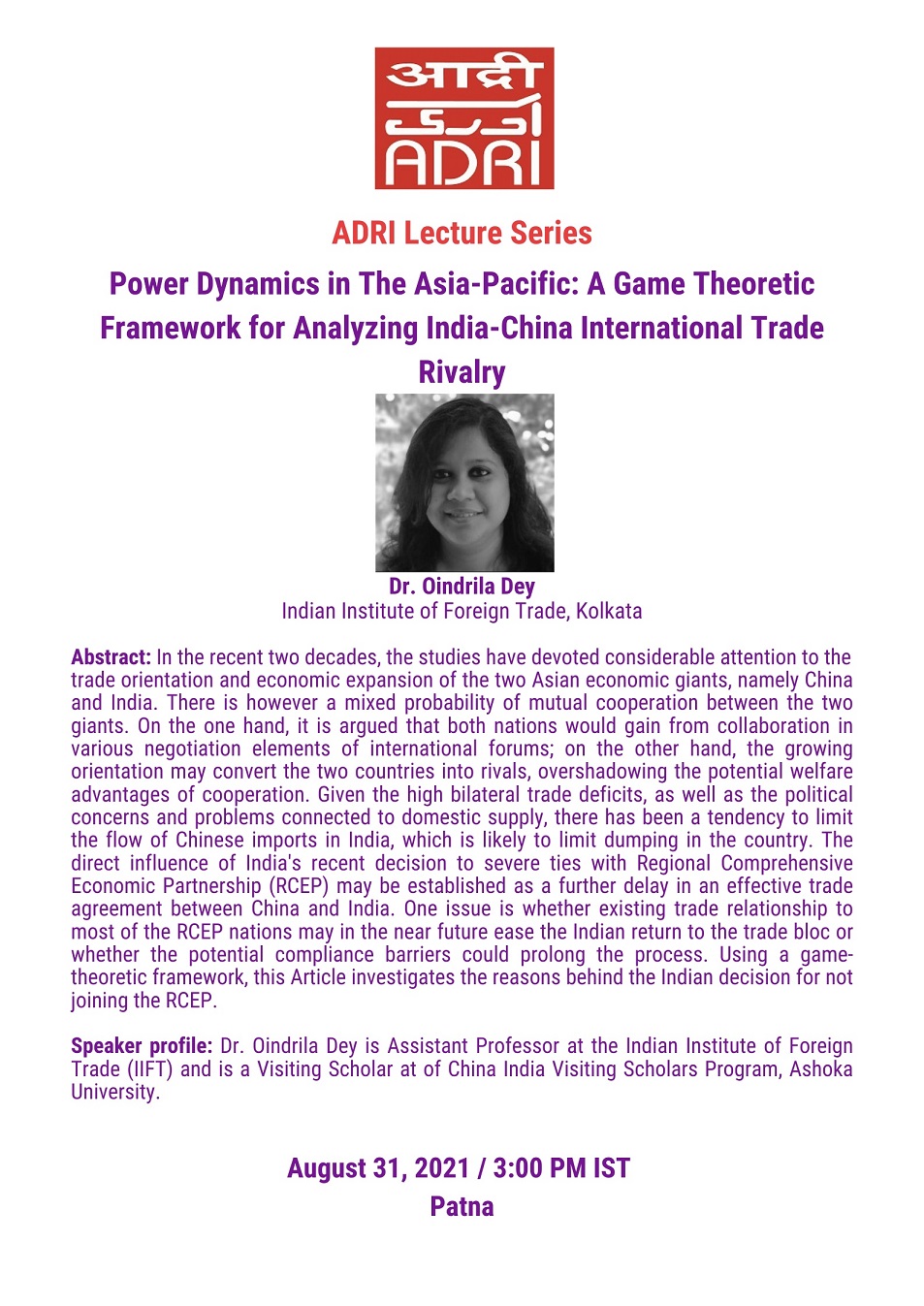Events of ADRI Patna
ADRI Lecture Series on Power Dynamics in The Asia-Pacific: A Game Theoretic Framework for Analyzing India-China International Trade Rivalry
 31 Aug 2021
31 Aug 2021

Speaker : Dr. Oindrila Dey,Indian Institute of Foreign Trade, Kolkata
Title: Power Dynamics in The Asia-Pacific: A Game Theoretic Framework for Analyzing India-China International Trade Rivalry
Speaker: Dr. Oindrila Dey,Indian Institute of Foreign Trade, Kolkata.
Date and Time: 31st August 2021 at 3.00 PM (IST)
Zoom Link Meeting: Zoom Link
Meeting ID: 820 2764 4864
Abstract: In the recent two decades, the studies have devoted considerable attention to the trade orientation and economic expansion of the two Asian economic giants, namely China and India. There is however a mixed probability of mutual cooperation between the two giants. On the one hand, it is argued that both nations would gain from collaboration in various negotiation elements of international forums; on the other hand, the growing orientation may convert the two countries into rivals, overshadowing the potential welfare advantages of cooperation. Given the high bilateral trade deficits, as well as the political concerns and problems connected to domestic supply, there has been a tendency to limit the flow of Chinese imports in India, which is likely to limit dumping in the country. The direct influence of India's recent decision to severe ties with Regional Comprehensive Economic Partnership (RCEP) may be established as a further delay in an effective trade agreement between China and India. One issue is whether existing trade relationship to most of the RCEP nations may in the near future ease the Indian return to the trade bloc or whether the potential compliance barriers could prolong the process. Using a game-theoretic framework, this Article investigates the reasons behind the Indian decision for not joining the RCEP.
Speaker Profile: Dr. Oindrila Dey is Assistant Professor at the Indian Institute of Foreign Trade (IIFT) and is a Visiting Scholar at of China India Visiting Scholars Program, Ashoka University.
Patna, 31 August. As part of the ADRI Online Lecture Series, Oindrila Dey has delivered a lecture titled "Power Dynamics in The Asia-Pacific: A Game Theoretic Framework for Analyzing India-China International Trade Rivalry” today. The paper was a collaborative work of Oindrial Dey and Debashis Chakraborty (Indian Institute of Foreign Trade, Kolkata Campus), and Julien Chaisse (City University of Hong Kong).
Oindrila Dey argued that over the recent two decades, a major section of the literature have devoted considerable attention to the trade orientation and economic expansion of the two Asian economic giants, namely, China and India. The two countries presently do not share a vibrant preferential trade agreement. The direct influence of India's recent decision to severe ties with Regional Comprehensive Economic Partnership (RCEP) may be viewed as a further delay in an effective bilateral trade agreement between India and China. It is important to judge whether the existing trade relationship of India to most of the RCEP nations may in near future ease its return to the trade bloc or whether the potential compliance barriers and threat perceptions could prolong the process. The current analysis evaluates India's RCEP pull-out decision and the possibilities of its re-entry in the bloc through a game-theoretic analysis. India’s long-term decision to re-enter RCEP would crucially depend on growth of domestic demand (and in turn, employment opportunities) and improvement in trade balance. Considering the strategic options of China, India and RCEP, the following conclusion is reached. If RCEP takes account of India's concerns about tariff reform flexibility and lowering of the NTMs, threats from Chinese dumping may be limited; otherwise China will continue to implement WTO-incompatible policies. It can be observed that taking recourse to WTO-incompatible instruments can emerge as dominant strategy (i.e., a lucrative option) for China, with the consequent ramifications for Indian dilemma over RCEP re-entry.
The lecture was presided by Dr. Ashmita Gupta, Assistant Professor, ADRI. The lecture was attended by scholars and academics from Patna and other places in the country.